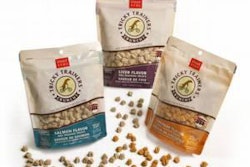
The acquisition of several pet food players over the past few years has highlighted the fact that “pet product deals are private equity’s best friend,” as an article in the Private Equity Analyst newsletter put it. “Private equity firms can’t seem to get enough of pet product companies, making them some of the darlings of an already popular segment, thanks to steady, stable consumer demand for their products even during challenging economic times,” wrote Lillian Rizzo.
For example, in June, V.I.P. Petfoods of Australia, one of the world’s largest makers of chilled pet food, was acquired by Quadrant Private Equity. In April, Partner in Pet Food (PPF), a large private label pet food manufacturer in Europe, was acquired by private equity firm Pamplona Capital Management from Advent International, another private equity group that had bought PPF in 2011.
That seems to be just after the private equity world started noticing how well the pet food and products industry had survived the recession, according to Carol Frank, managing director of SDR Ventures, an investment bank specializing in this market. “In 2008/2009, they looked back on the growth that the pet industry continued to have, even as the rest of the retailing and manufacturing world was not thriving,” Frank said, quoted in a 2014 Pet Business article by Mark Kalaygian.
Rizzo’s article included a table of pet industry-private equity deals from October 2013 to October 2014, such as the May 2014 acquisition of C.J. Foods, a large private label pet food manufacturer based in the US, by J.H. Whitney Capital Partners; pet treat maker Cloud Star’s purchase in July 2014 by Frontenac; and the January 2014 acquisition of Phillips Pet Food & Supplies, a large pet product distributor, by Thomas H. Lee Partners.
Phillips’ main competitor, Animal Supply Co., has enjoyed similar infusions of private equity investment, spurring both distributors to go on acquisition sprees themselves. This consolidation has significantly narrowed the supply chain for independent pet specialty retailers, according to Kalaygian, as they often seek to differentiate by carrying product lines—especially premium pet food brands—not sold by the large pet store chains.
Smaller pet food and product companies might also feel the heat from private equity’s passion. The proprietor of one company, commenting on social media, described private equity groups as “circling like sharks. As a small firm with a big brand, we can see shark fins everywhere!”
Yet, the interest seems to fuel product development, as smaller companies gain resources to ramp up R&D and product launches once they receive an infusion of cash from a new private equity owner.
With pet owners continuing to pamper their furry family members, private equity is not likely to fall out of love with pet products anytime soon.
Private equity reshaping pet food
www.petfoodindustry.com/blogs/7-adventures-in-pet-food/post/5053


















